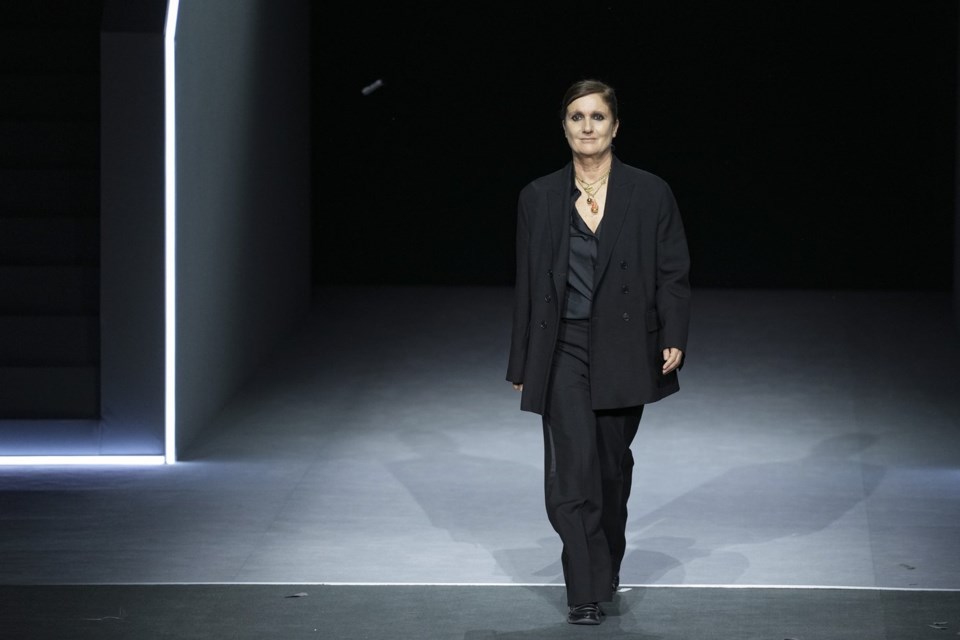PARIS (AP) — Maria Grazia Chiuri, the first woman to lead Dior’s women’s collections, announced Thursday she is stepping down as creative director after nine years at the storied French fashion house — the latest sign of mounting pressure and ongoing creative turnover at the top of the fashion industry.
The Italian designer confirmed her long-rumored departure in an Instagram post, capping a transformative era defined by bold feminist messaging, record sales and industry-defining collections.
“I am particularly grateful for the work accomplished by my teams and the ateliers. Their talent and expertise allowed me to realize my vision of committed women’s fashion, in close dialogue with several generations of female artists,″ Chiuri wrote. “Together, we have written a remarkable and impactful chapter, of which I am immensely proud.”
Chiuri, 60, leaves behind a legacy that reshaped Dior’s creative direction and broadened its global appeal. Since her arrival in 2016, she steered Dior through a golden era of commercial and cultural success. Revenue reportedly rose by nearly $8 billion from 2017 to 2023 as Chiuri’s vision of empowered femininity resonated with a new generation of clients.
The house itself credited Chiuri with nothing less than redefining "the identity and femininity of the Dior woman, celebrated and reimagined the iconic heritage and savoir-faire.”
Delphine Arnault, the LVMH executive who oversees Dior, paid tribute to Chiuri’s “tremendous work with an inspiring feminist perspective and exceptional creativity, all imbued with the spirit of Monsieur Dior.” Chiuri, Arnault added, not only designed “highly desirable collections” but “has written a key chapter in the history of Christian Dior” — a chapter that will forever be marked by the milestone of her being the first woman to lead the women’s collections.
Chiuri’s debut for Spring 2017 made headlines with “We Should All Be Feminists” T-shirts, declaring a new era for Dior. She brought activism to the runway, collaborating with artists like Judy Chicago and Faith Ringgold. She revived icons such as the Saddle Bag and made space for women’s voices, drawing on Dior’s past while rewriting its aesthetic.
Chiuri departs as the first woman to lead Dior since its founding in 1947, having redefined the house’s codes and opened the door to a new chapter at one of fashion’s most influential brands. Her exit comes amid a broader wave of creative upheaval across the industry. Pierpaolo Piccioli, her former co-creative director at Valentino, was recently named artistic director of Balenciaga — after Alessandro Michele, known for his maximalist, gender-fluid reinvention of Gucci, was appointed to succeed Piccioli at Valentino in 2024.
Meanwhile, Matthieu Blazy, who stepped down from Bottega Veneta last year, will debut at Chanel this fall, succeeding Virginie Viard — whose unceremonious departure shocked the industry.
The recent round of high-profile exits and appointments has amounted to fashion’s most dramatic game of musical chairs in years — and it’s giving the industry whiplash.
The moves reflect a period of transition for major fashion houses as they adapt to shifting consumer expectations, slower luxury growth, and the demands of a digital-first market. At least half a dozen top houses have changed creative leadership in the past year alone — a sign of the mounting pressure on designers to deliver both artistic vision and commercial results in an increasingly unstable landscape.
Chiuri's shows spanned continents, from Mumbai to Kyoto, each celebrating craft and community. But for her final collection, Resort 2026, Chiuri returned home to Rome — staging the show at Villa Torlonia, enveloping her guests in ritual white, and invoking the spirit of Italian cinema with a film by Matteo Garrone. The choice of her native city, paired with the all-white dress code, signaled a deliberate full-circle moment; an intimate farewell and a subtle hint that Chiuri was preparing to close her chapter at Dior.
Dior has not yet named a successor, but speculation centers on Jonathan Anderson, who recently took over Dior’s men’s collections.
Thomas Adamson, The Associated Press



